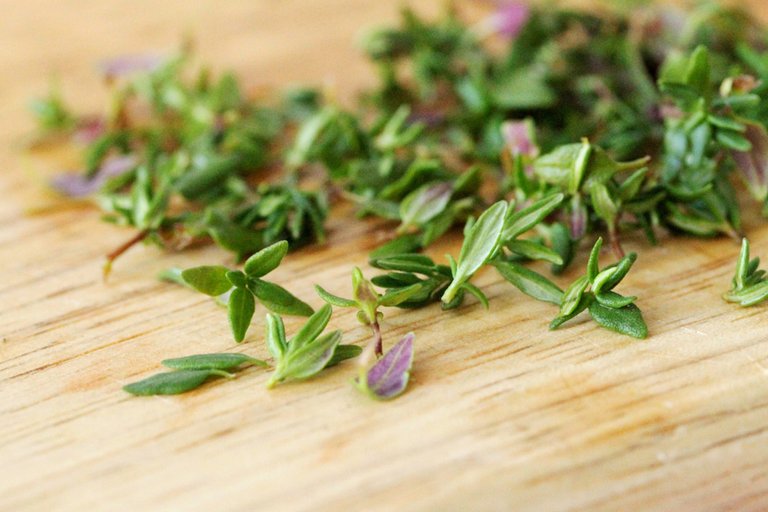There are few things a sprig of thyme won’t make immensely better. This versatile herb blends well with a myriad
of flavors and is packed full of health-promoting compounds, vitamins, antioxidants, and other nutrients.

What Is Thyme?
Thyme is an evergreen herb that blooms with small white, pink, and purple flowers. They hybridize easily and grow quickly in sunny areas with well-drained soil. Thanks to its ease of cultivation and growth, there are over 300 varieties of thyme in existence today. Each variety has unique flavors and applications for cooking, oils, medicines, or decoration. Common thyme (T. vulgaris) and lemon thyme (T. citriodorus) are used for cooking, while Spanish thyme (T. zygis) and creeping thyme (T. serpyllum) are popular in many herbal supplements.
History of Thyme?
People’s love and admiration for thyme is nothing new. The recorded history of thyme extends back to ancient Egypt and Rome. Egyptians used thyme as part of their mummification process and Romans ate it before meals and gave it to soldiers as a sign of courage and admiration. In fact, the Latin word for thyme, thymus, means courage and strength. This tradition of giving thyme to soldiers carried on through the middle ages when people in England started using thyme as a cooking spice.
Nutrients in Thyme
Thyme has remained influential over the years in part because of its health benefits, all of which are owed to its diverse profile of vitamins, minerals, and other essential nutritional compounds. Thyme is an excellent source of fiber, calcium, iron, manganese, and vitamins A, B6, and C. There are also robust phenols inside the plant—thymol, eugenol, and carvacrol.
Here is a list of impressive health benefits that have been corroborated by recent studies and research.
1. Resists Harmful Organisms
Thyme contains potent chemical compounds like thymol and carvacrol which are resistant to harmful organisms. Studies have found that thyme promotes fungal balance. Some studies even show compounds found in thyme and oregano oil are helpful as part of a comprehensive strategy for dealing with some types of organisms that are particularly aggressive.
2. Supports Respiratory Health
Respiratory health is important, especially for those with compromised immune systems. Thyme supports normal respiratory health in every season. Studies show that thyme combined with primrose root helps soothe your airways and promote normal lung health.
3. Promotes Heart Health
Blood pressure and cholesterol both play a significant role in heart health. Thyme contains nutrients that support normal blood pressure and cholesterol levels.
4. Mood Booster
Thyme may help maintain mental wellness. Daily consumption of thyme and oregano oil can influence neurotransmitters and boost your mood. One compound found in thyme oil, carvacrol, when consumed over a seven-day period, positively affected dopamine and serotonin status.
5. Natural Bug Repellent
Thyme is a favorite herb to grow at home. Not only is it convenient for cooking, but it may help keep your home bug free. Thyme acts as a natural repellent for mosquitoes and other pests.
6. Encourages Healthy-looking Skin
For years, nurses wrapped thyme into bandages to help wounds heal. Recent studies confirm that thyme does have the ability to support skin health. One study even noted thyme might contribute to reducing the appearance of wrinkles.
7. Powerful Antioxidant
Thyme is a great source of antioxidants such as apigenin, luteolin, saponins, and tannins. These antioxidant compounds help neutralize free radicals before they can cause harm and oxidative stress. Thyme and iron are often taken together to help keep a better balance and reduce the chances of oxidative stress from occurring.
8. Soothes Occasional Coughs and Sore Throats
For years, thyme has been used to support seasonal wellness. Many studies have validated this use, showing thyme’s ability to help your body get over an occasional cough and sore throat.
9. Food Safety and Preservation
While thyme is a well-liked addition to many dishes, it can be used for more than taste. Thyme’s resistance to harmful organisms is something that’s been observed and harnessed by large-scale food producers. Thyme essential oil is an effective, natural way to preserve food and increase shelf life.
10. Promotes Oral Health
Thyme, along with other herbs, can support good oral health.Thyme essential oils can protect against harmful organisms that target the mouth, and help prevent bad breath.
Thyme Side Effects
Thyme has no documented side effects. The primary concern with using fresh thyme or thyme essential oils is the possibility of having an allergic reaction. Beyond any known allergies, thyme is considered safe and gentle to eat or apply topically.
Adding Thyme to Your Diet
You can grow thyme at home or buy it fresh at most grocery stores and farmer’s markets. Fresh thyme is perfect for making tinctures, teas, or adding to food dishes. Dried thyme is also found in any spice aisle and is an excellent way to keep the herb in your home at all times. Thyme essential oils are also a great way to access the benefits of thyme quickly and easily. Not all essential oils are food grade, but thyme essential oils can be used in a diffuser or applied topically.
You can also take thyme therapeutically to reap its many health benefits. While thyme is great on its own, its nutritional profile and unique properties make it a worthwhile addition to some supplement formulas. Global Healing Center uses the highest quality organic thyme in our revolutionary iron supplement, Iron Fuzion . Thyme extracts in Iron Fuzion provide nutrients that can help your body absorb and use iron.
Hi! I am a robot. I just upvoted you! I found similar content that readers might be interested in:
https://www.globalhealingcenter.com/natural-health/10-health-benefits-thyme/
Thanks for the good article